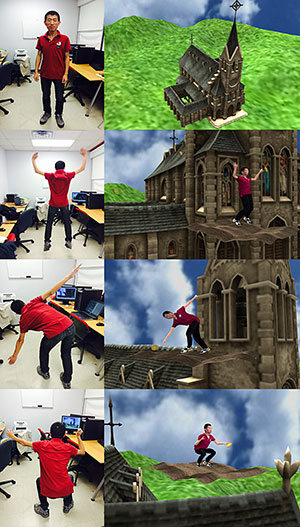NIH Grant Supports Design of Video Games to Promote Physical Activity in Youth
Zhigang Deng of UH Computer Science Collaborating with Baylor College of Medicine

While UH Ph.D. student Xifeng Gao is performing physical activity, his movements are dynamically tracked to animate his own avatar in the game. (Photo Credit: Cheng Chen, UH Computer Science Graduate Student) Video games capture the attention of young people. Researchers from the University of Houston’s Department of Computer Science and Baylor College of Medicine hope to capitalize on that fascination by creating games that promote physical activity.
Zhigang Deng, associate professor of computer science, received a two-year grant from the National Institutes of Health for a feasibility study exploring the design of immersive video games for 10 to 14 year olds. The $428,000 grant is funded through NIH’s National Institute of Child Health and Human Development.
Linking Fun and Physical Activity
“We’re going to design youth-oriented, immersive games where the player’s live body actions can control the fate of an avatar in a virtual world,” Deng said. “The object is to take something fun and tie it to physical activity. This age group is at risk for low levels of physical activity.”
Deng says that players appear to identify with avatars, particularly those that resemble the person playing the game. The games will be movement driven, and Deng is designing a method to unobtrusively measure calories burned while playing.
“If we can encourage a habit of physical activity through video games that kids enjoy, we hope the behavior will be maintained over time,” Deng said.
Collaboration with Medical Center
The research is in collaboration with co-principal investigator Deborah Thompson, who is an associate professor of pediatrics at Baylor College of Medicine and a research nutritionist with the USDA Children’s Nutrition Research Center. Thompson will recruit healthy, 10 to 14 year olds to participate in the study.
 Deng and Thompson will survey and interview the study volunteers to learn more about the types of games they like. Once the games are developed, study participants will come to UH to play the prototype games, and researchers will collect additional information and data.
Deng and Thompson will survey and interview the study volunteers to learn more about the types of games they like. Once the games are developed, study participants will come to UH to play the prototype games, and researchers will collect additional information and data.
“We will get their feedback and will be able to flex and change the games based on the input we receive from the participants,” Deng said.
The collaborators hope this feasibility study will provide the basis for a larger study to assess the efficacy of specialized video games for increasing physical activity in youth.
- Kathy Major, College of Natural Sciences and Mathematics